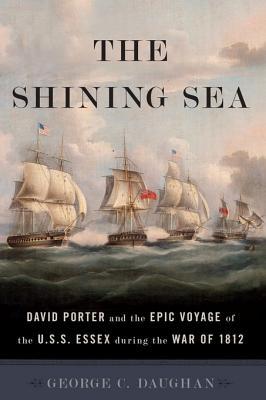
The Shining Sea
David Porter and the Epic Voyage of the U.S.S. Essex during the War of 1812
کتاب های مرتبط
- اطلاعات
- نقد و بررسی
- دیدگاه کاربران
نقد و بررسی

September 2, 2013
The War of 1812 has mostly retreated from the national consciousness, even though it resulted in the burning of Washington, D.C. Maritime historian Daughan provides a reminder that 1812 was actually a global war and chronicles—capably, if drily, with many passages packed with long-forgotten sailing terminology—“the most famous voyage of the war, and one of the most spectacular in the entire age of fighting sail.” Momentous as the Essex’s journey was, its strategic relevance to the conflict is ambiguous. Stalled in the Atlantic, Capt. David Porter had to kill his valuable pigs and goats to conserve water—monkeys, however, were spared, since they were considered essential entertainment. Other animals were less welcome: rats tormented the sailors by “chewing through water casks... and eating their way through just about every part of the ship.” Porter, ready to break from capturing British vessels off South America, sailed for Polynesia to annex “Nuku Hiva in the name of the United States, even though he had no authorization from his government to do so.” Military subterfuge was likely not his primary concern, as “nothing engrossed sailors as much as thoughts of Polynesian women.” Daughan’s history provides the facts about this high-seas adventure, but readers may wish that his account was more entertaining.

August 1, 2013
A technical term-packed mini-history of the War of 1812 and biography of Capt. David Porter (1780 -1843). Daughan (If By Sea: The Forging of the American Navy--From the Revolution to the War of 1812, 2008, etc.) stuffs the book so full of nautical terms that many readers will require a dictionary to search for words not included in the glossary. Porter began his career as a merchantman when he was 16, and he eventually joined the new U.S. Navy under President John Adams. He fought in the Quasi-War with France in 1798 and spent nearly 20 months in a prison in Tripoli after fighting the Barbary pirates. The War of 1812 gave Porter his chance to advance his career. President James Madison didn't plan on much help from the Navy until Porter's Essex took eight prizes and then a ship of the Royal Navy. Madison sent him out again to harass British shipping in the South Atlantic, and eventually, he "doubled the horn" (sailed around) into the Pacific, where he successfully harassed British whalers. While in the Marquesas to resupply the ship, however, Porter overdid it by claiming the islands for the United States, a decision that had lasting effects for only a month after he pulled out. Mostly, he was looking for a fight with the British, who were searching the seas for him. After so many successful encounters, his arrogance would prove his undoing. The escapades of Porter illustrate how the men who made the U.S. Navy great succeeded against great odds and across vast oceans. Daughan is obviously well-versed in and passionate about his subject, but landlubbers will find the technical terms off-putting.
COPYRIGHT(2013) Kirkus Reviews, ALL RIGHTS RESERVED.

October 1, 2013
With substantial background information on the U.S. Navy, its circumstances of battle in the War of 1812, and the naval careers of principal commanders, Samuel Eliot Morison Award winner Daughan (If by Sea) centers on Capt. David Porter's time commanding the American frigate Essex and extending the War of 1812 into the Pacific. Porter's cruise began in early 1813 when he was ordered to harass the British with commerce raiding. He made the momentous decision to take the war to the English whaling grounds off the west coast of South America, where he captured numerous enemy vessels and was so disruptive that the English diverted several warships to catch him. Daughan richly describes the Essex's voyage, including the dangers and privations from the weather, enemy action, crew indiscipline, and the vagaries of handling a wooden ship under sail. He questions Porter's judgment in interfering in the affairs of the natives of Nuku Hiva (which he claimed as a U.S. possession) and his seeking a glorious frigate-to-frigate battle instead of preserving his ship as a continued threat through raids. VERDICT Readers, especially those well versed in naval history and terminology, will revel in this lively and thoroughly researched work covering a cruise on its bicentennial.--Lawrence Maxted, Gannon Univ. Lib., Erie, PA
Copyright 2013 Library Journal, LLC Used with permission.

























دیدگاه کاربران